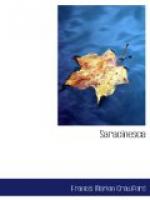Three days after Ugo’s disappearance, the old Prince got into his carriage and drove out to Saracinesca. More than a month had elapsed since the marriage, and he felt that he must see his son, even at the risk of interrupting the honeymoon. On the whole, he felt that his revenge had been inadequate. Del Fence had escaped the Holy Office, no one knew how; and Donna Tullia, instead of being profoundly humiliated, as she would have been had Del Ferice been tried as a common spy, was become a centre of attraction and interest, because her affianced husband had for some unknown cause incurred the displeasure of the great Cardinal, almost on the eve of her marriage—a state of things significant as regards the tone of Roman society. Indeed the whole circumstance, which, was soon bruited about among all classes with the most lively adornment and exaggeration, tended greatly to increase the fear and hatred which high and low alike felt for Cardinal Antonelli—the man who was always accused and never heard in his own defence.
CHAPTER XXXIV.
People wondered that Giovanni and Corona should have chosen to retire into the country for their honeymoon, instead of travelling to France and England, and ending their wedding-trip in Switzerland. The hills were so very cold at that early season, and besides, they would be utterly alone. People could not understand why Corona did not take advantage of the termination of her widowhood to mix at once with the world, and indemnify herself for the year of mourning by a year of unusual gaiety. But there were many, on the other hand, who loudly applauded the action, which, it was maintained, showed a wise spirit of economy, and contrasted very favourably with the extravagance recently exhibited by young couples who in reality had far more cause to be careful of their money. Those who held this view belonged to the old, patriarchal class, the still flourishing remnant of the last generation, who prided themselves upon good management, good morals, and ascetic living; the class of people in whose marriage-contracts it was stipulated that the wife was to have meat twice a-day, excepting on fast days, a drive—the trottata, as it used to be called—daily, and two new gowns every year. Even in our times, when most of that generation are dead, these clauses are often introduced; in the first half of the century they were universal. A little earlier it used to be stipulated that the “meat” was not to be copra, goat’s-flesh, which was considered to be food fit only for servants. But the patriarchal generation were a fine old class in spite of their economy, and they loudly aplauded Giovanni’s conduct.




